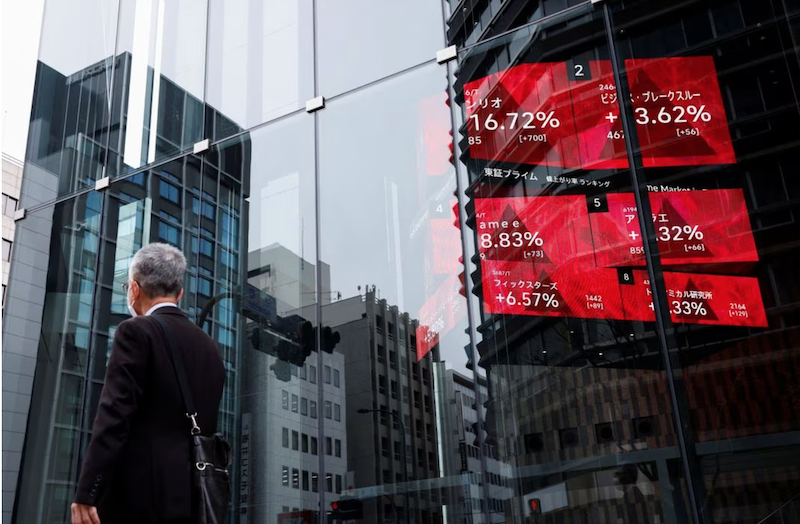Asia’s major stock indexes were under pressure again as the situation in the Middle East remained volatile and the likelihood of higher interest rates for some time to come also dampened the mood.
Shares hit seven-month lows as the risk of a wider conflict outside of Gaza and fading hopes of central banks easing this year soured sentiment at the start of a week full of mega-cap earnings and key data.
Bonds were also under pressure as US 10-year Treasury yields hovered around 5.0%, pushing borrowing costs up across the globe and testing equity valuations.
Also on AF: US Chip Export Ban Seen as Big Opportunity for Huawei
Japan’s Nikkei share average closed below the psychologically important 31,000 level as events in Israel kept investors on edge, sending a gauge of volatility spiking to a one-year high.
The Nikkei slid 0.83% to close the day at 30,999.55. It had earlier sunk to a two-week low of 30,974.26, but sellers piled back in during the final two minutes of trading. The broader Topix declined 0.75%.
Of the Nikkei’s 225 components, 175 fell versus 48 that rose, with two flat. A Nikkei volatility index spiked as high as 23.87, a level not seen since October 28.
Crude oil continued to climb down from multi-week highs, which made resource shares the Nikkei’s worst performers.
Chip-related shares also underperformed, tracking US peers as long-term Treasury yields at 16-year highs dimmed the outlook for so-called growth stocks.
China’s stock market index dropped to its lowest level since before the coronavirus pandemic in 2019, as the world’s second biggest economy continues to struggle to find any momentum.
The Shanghai Composite Index dropped 1.47%, or 43.77 points, to 2,939.29, while the Shenzhen Composite Index on China’s second exchange retreated 1.86%, or 33.75 points, to 1,776.71.
The CSI 300 index in Shanghai fell by 1.04% to 3,474.24 points on Monday, after earlier hitting its lowest since February 2019. Hong Kong’s Hang Seng was closed for a holiday.
Elsewhere across the region, Indian stocks dropped with Mumbai’s signature Nifty 50 index down 1.04%, or 202.45 points, at 19,340.20. MSCI’s broadest index of Asia-Pacific shares outside Japan slipped 0.5% to its lowest in almost a year.
Microsoft, Alphabet, Amazon Earnings
The European Central Bank and Bank of Canada hold policy meetings this week and, while no hikes are expected, investors will be sensitive to guidance on futures moves.
The recent surge in bond yields has tightened monetary conditions without the central banks having to do anything, allowing the Federal Reserve to signal it will likely stay on hold at its policy meeting next week.
The jump in the 10-year Treasury yield towards the 5% level has challenged equity valuations and dragged most major indices lower last week, while the VIX “fear index” of US stock market volatility hit its highest since March.
The MSCI All-World index was last down 0.1%, at its lowest since late March, when turmoil that had gripped the global banking sector started to subside. In Europe, the STOXX 600 was roughly flat, around last week’s seven-month lows.
Mega caps Microsoft, Alphabet, Amazon and Meta Platforms all report earnings this week. IBM and Intel are also on the docket.
The US’s outperformance has underpinned the dollar, though the threat of Japanese intervention has capped it at around 150.00 yen at least for the moment. The dollar was last trading at 149.93 yen, just below the recent peak of 150.16.
Yields in Japan were also on the rise on speculation the Bank of Japan was discussing a further tweak to its yield curve control policy, which might be announced at its policy meeting on October 31.
Gold, which hit its highest since May last week thanks also to safe-haven inflows, eased 0.3% to $1,975 an ounce.
Oil prices gave back some ground in the absence of any imminent risk of disruption to supplies from the Middle East. Brent crude fell 1% to $91.28 a barrel, while US crude eased 1.2% to $87.04.
Key figures
Tokyo – Nikkei 225 < DOWN 0.83% at 30,999.55 (close)
Hong Kong – Hang Seng Index <> CLOSED
Shanghai – Composite < DOWN 1.47% at 2,939.29 (close)
London – FTSE 100 < DOWN 0.30% at 7,379.97 (1002 BST)
New York – Dow < DOWN 0.86% at 33,127.28 (Friday close)
- Reuters with additional editing by Sean O’Meara
Read more:
China’s Central Bank Chief Pledges ‘Forceful’ Economic Support
Rising US Yields Spur Major Outflow From Asian Bonds in Sept
Nikkei, Hang Seng Dip as Israel-Gaza War Threatens to Spread























